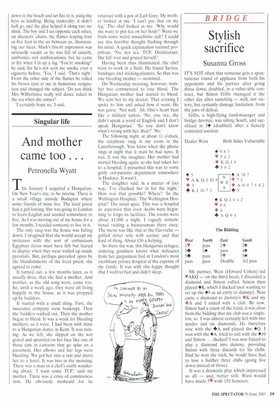And mother came too . . .
Petronella Wyatt
This January I acquired a Hungarian. On New Year's day, to be precise. There is a small village outside Budapest where some friends of mine live, The local priest had a girl leaving. She was going to London to learn English and needed somewhere to live. As I was moving out of my house for a few months, I needed someone to live in it.
The only snag was the house was falling down. I imagined that she would accept my invitation with the sort of enthusiasm Egyptian slaves must have felt but feared to display when they were walled up inside pyramids. But, perhaps prevailed upon by the blandishments of the local priest, she agreed to come.
It turned out, a few months later, as it usually does, that she had a mother. And mother, as the old song went, came too. So, until a week ago, they were all living happily in the house, as it was propped up by builders.
It started with a small thing. First, the insurance company went bankrupt. Then the builders walked out. Then the mother began to bleed. It was a week for bleeding mothers, as it were. I had been with mine to a Hungarian dance in Kent. It was raining. As we left, she slipped on the wet gravel and sprawled on her face like one of those cats in cartoons that go splat on a pavement. Her elbows and her legs were bleeding. We got her into a taxi and drove her to a hotel. It was two in the morning. There was a man in a chefs outfit wandering about. 'I want some TCP,' said my mother. There was a crisis of communication. He obviously misheard for he returned with a pot of Earl Grey. My mother looked at me. 'I can't put that on my leg,' The chef looked at me, 'Why would she want to put tea on her body?' Were we from some weird masochistic cult? I could see this horrible thought flashing through his mind. A quick explanation seemed propitious. 'No, not tea. TCP. Disinfectant. She fell over and grazed herself.'
Having been thus illuminated, the chef went to work in a flash. He found Savlon, bandages and sticking-plasters. So that was one bleeding mother — stemmed.
On Wednesday morning, however, number two commenced to lose blood. The Hungarian mother had started to bleed. We sent her to my doctor. That evening I spoke to him and asked how it went. He was grave. 'Not well.' Ah. One's heart beat like a military tattoo. 'No, you see, she didn't speak a word of English and I don't speak Hungarian.' 'So you don't know what's wrong with her, then?' No.'
The following night, at about 11 o'clock, the telephone rang in my room in the Lanesborough. You know when the phone rings at night that it must be bad news. It was. It was the daughter. Her mother had started bleeding again, so she had taken her to a hospital. I presumed this was to some grisly out-patients department somewhere in Hackney. It wasn't.
The daughter said, in a matter of fact way, 'I've checked her in for the night.' How was that possible? Where? 'In the Wellington Hospital.' The Wellington Hospital? The mind spun. This was a hospital so expensive that even Arabs were beginning to forgo its facilities. The rooms were about £1,000 a night. I vaguely remembered visiting a businessman there once. The menu was like that at the Gavroche grilled dover sole with caviare and that kind of thing. About £30 a helping.
So there she was, this Hungarian refugee, ordering goodness knows what delicacies from her gargantuan bed in London's most exorbitant private hospital at the expense of my family. It was with this happy thought that I went to bed and didn't sleep.










































































 Previous page
Previous page